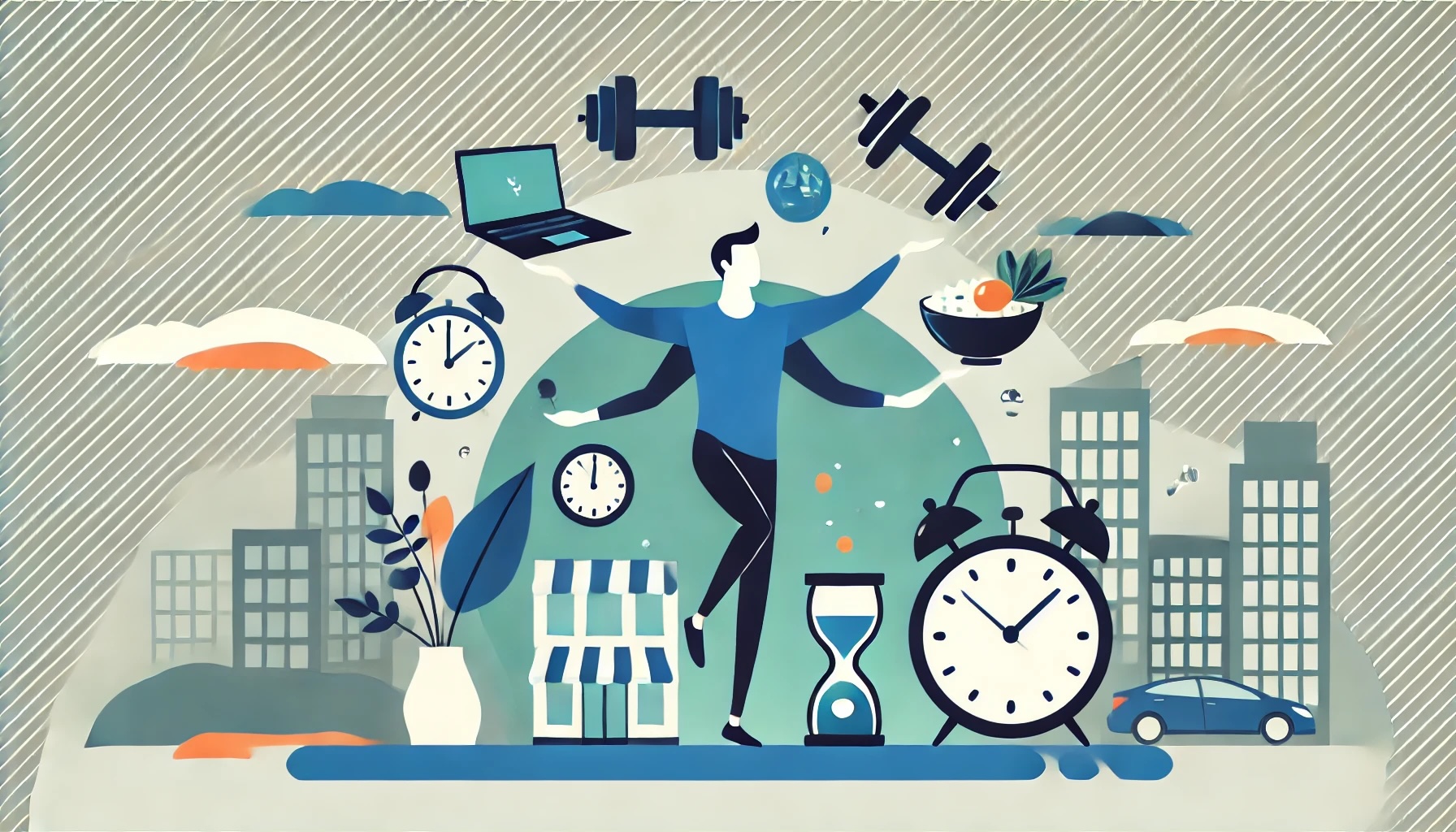In today’s fast-paced society, we face endless challenges and pressures: demanding work schedules, complex relationships, family responsibilities, and rising living costs. This lifestyle often leaves people feeling exhausted and leads to both physical and mental health issues. However, no matter how fast life moves, health remains the cornerstone of achieving our dreams.
This article explores how to find and maintain a healthy balance in a busy life by focusing on time management, dietary habits, exercise planning, and mental health care.
Why Does a Fast-Paced Life Impact Health?
A fast-paced lifestyle is often accompanied by high stress and unhealthy habits, such as:
• Irregular eating habits: People tend to choose fast food or high-calorie meals when busy.
• Lack of exercise: Sedentary work and limited time for physical activity are common.
• Sleep deprivation: Sacrificing sleep for overtime work or late-night entertainment.
• Increased mental pressure: Balancing work and personal life can lead to anxiety and burnout.
These factors gradually erode our health, but through scientific approaches, we can achieve balance and maintain overall well-being.
How to Maintain a Healthy Balance in a Fast-Paced Life?
Efficient Time Management
Set Priorities
Understand your goals clearly and prioritize important tasks. Using tools like the “Eisenhower Matrix” to categorize tasks into “urgent and important” or “important but not urgent” can help organize your schedule effectively.
Avoid Multitasking
Focusing on one task at a time is more efficient than juggling multiple tasks and reduces both errors and stress.
Learn to Say No
Don’t feel obligated to accept every request. Saying no to unnecessary tasks or social engagements frees up time for rest and relaxation.
Plan Breaks
Schedule fixed breaks during your busy day. For example, take a 5–10-minute break after every hour of work to boost productivity and alleviate fatigue.
Maintain a Balanced Diet
Plan Nutritious Meals
Stick to regular meal times and avoid skipping breakfast or replacing meals with unhealthy snacks.
Choose Nutrient-Rich Foods
In a fast-paced lifestyle, opt for foods that are convenient yet healthy, such as:
• Protein-rich options: Eggs, fish, beans, and legumes provide sustained energy.
• Fiber-packed choices: Whole grains, fruits, and vegetables aid digestion and keep you feeling full.
• Healthy fats: Avocados, nuts, and olive oil support brain health and energy levels.
Control Portion Sizes and Eating Frequency
Avoid overeating or going too long without food. Eating smaller, more frequent meals helps maintain energy levels throughout the day.
Limit Processed Foods
Reduce consumption of high-sugar, high-salt, and high-fat foods. Opt for natural ingredients to prepare quick and wholesome meals.
Stay Active Despite a Busy Schedule
Create a Doable Exercise Plan
Even without gym time, you can incorporate exercise into your daily routine:
• Walk for 30 minutes daily or consider walking to work.
• Perform 10–15 minutes of high-intensity interval training (HIIT) at home.
• Do simple stretches or squats during office breaks.
Engage in Enjoyable Activities
Find exercises you enjoy, such as yoga, dancing, or cycling, so workouts become something to look forward to instead of a chore.
Maximize Weekend Time
Use weekends for longer workouts like hiking or participating in a run to release stress while staying fit.
Prioritize Mental Health
Regulate Your Emotions
Fast-paced living can lead to emotional swings. Learning emotional regulation techniques is crucial for maintaining mental well-being. Try:
• Deep breathing exercises: Practice diaphragmatic breathing to calm your mind.
• Meditation: Spend 5–10 minutes meditating daily to reduce anxiety.
• Gratitude journaling: Write down things that make you happy each day to foster positivity.
Build a Support Network
Maintain connections with family and friends. Seek help during difficult times, as sharing your thoughts and receiving support can ease mental burdens.
Limit Screen Time
Excessive use of electronic devices increases stress. Set daily limits on screen usage to give your mind a break.
Get Enough Sleep
Establish a Consistent Sleep Schedule
Go to bed and wake up at the same time each day to help your body maintain a healthy circadian rhythm.
Create a Sleep-Friendly Environment
Ensure your bedroom is quiet, dark, and cool. Avoid screens before bedtime, and consider reading or listening to soothing music to wind down.
Avoid Stimulants
Minimize caffeine intake in the afternoon and evening to ensure it doesn’t interfere with your sleep quality.
How to Maintain Healthy Habits Long-Term in a Fast-Paced Life?
Set Small, Achievable Goals
Don’t try to change all your habits at once. Start with manageable goals, such as drinking an extra glass of water daily or exercising twice a week.
Track Your Progress
Use health apps or journals to monitor your habits and progress. This will help you adjust your plan and celebrate milestones.
Reward Yourself
Celebrate achieving health goals with small rewards, like a healthy treat or a relaxing weekend getaway, to make your journey enjoyable.
Conclusion
Maintaining a healthy balance in a fast-paced life is challenging but achievable. By managing your time effectively, adopting balanced eating habits, incorporating regular exercise, and prioritizing mental health, you can significantly improve your quality of life.
Health is not just a state but a result of conscious choices and actions. We hope this article provides practical insights to help you stay healthy and vibrant in a busy world.




















